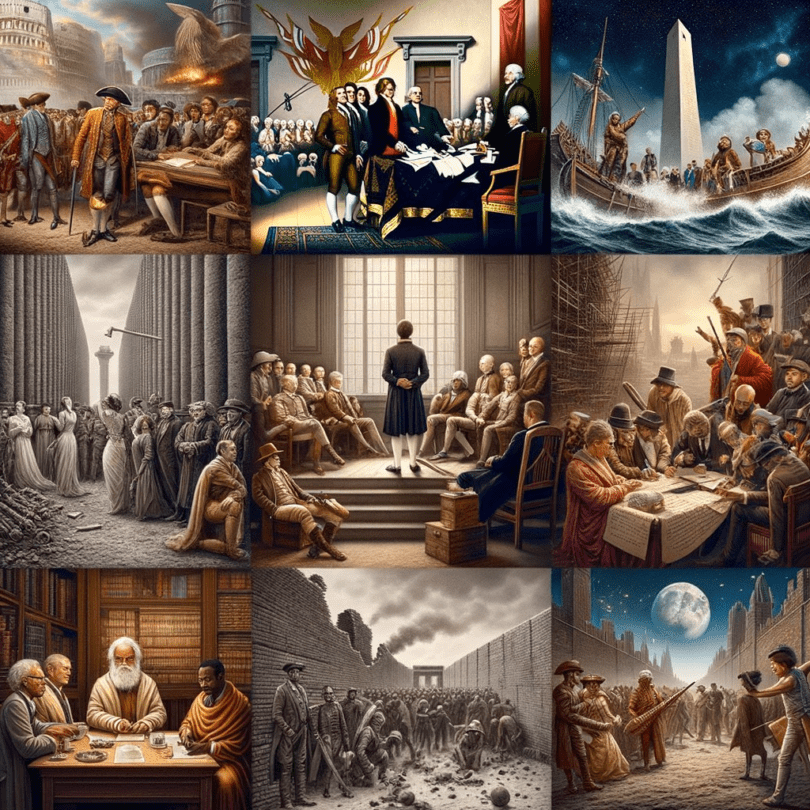I’m a total sucker for those goosebump moments when history seems to pause, and it’s like you can almost hear the creaking and groaning of time itself, transforming everything beneath our feet. It’s these game-changer events that twist and turn humanity’s path, giving shape to cultures, societies, and… well, our whole destiny, really. So here I am, wanting to take you on a bit of a whimsical voyage through ten events that are etched—nay, seared—into the annals of history. Not just boring dates, but substantial stuff that twirled our world around.
The Fall of Constantinople
Picture this: the colossal walls that shielded Constantinople – mighty, unyielding. These stone leviathans kept the Byzantine Empire’s crown jewel safe… until 1453 wrested it away, landing the city in the clammy grip of the Ottoman Turks. Talk about a plot twist! The fall didn’t just topple an empire; it shook up Europe and Asia, ironed out new trade paths, and spurred on the Renaissance as scholars flung themselves west, clutching precious manuscripts like they were life itself.
Every time I think of the Fall of Constantinople, there’s this pang in my heart. Those alleyways, drenched in ancient colors at sunset—they saw the last pulses of a civilization. It’s such a bittersweet end, a hope-drenched beginning. Political maps were tossed in the air, sparking intellectual wildfire and challenging east-west dynamics in ways the world had never seen before.
The Discovery of the New World
Zoom on forward to the tail-end of the 15th century, and you’ve got Christopher Columbus setting sail on the grand quest for, well, Asia. But oh, the curveball life threw at him! He stumbles upon the “New World,” sparking a clash of cultures that upended history’s applecart.
Now, the discovery opened up treasure chests of wealth and chances, but it dragged along a darker shadow. Indigenous peoples got hit by conquest, diseases, and upheaval. It’s a grab-bag of high-seas adventure stories with a stark edge, where Old meets New and cultures tango—sometimes in perfect harmony, often in dissonance.
The Industrial Revolution
Let’s roll into the smog-cloaked 18th century. The world cast off its old ways, and with clanging and hissing, the Industrial Revolution erupted. The age of machines was born. Suddenly, factories were as common as sunflowers, and steam engines redefined travel.
There’s this haunting beauty in the shift from sleepy pastoral life to chaotic industrial age. It’s where wonder jousted with a tinge of sadness—the loss of tranquil simplicity versus the ceaseless march into modernity. Cities boomed, economies pivoted, but the gap between rich and poor snaked out, intricate and expansive.
The Signing of the Magna Carta
Turn the dial to 1215—a quiet storm. King John of England’s antics led him to sign a scroll that sparked world-altering change—the Magna Carta. Not just a snazzy piece of parchment, it shaped democracy as we know it and toyed with the age-old tug-of-war between power and people.
I think of this moment like a stage whisper. When the ink settled, it triggered resonations that molded rules and rights around the globe, embedding the notion that authority isn’t absolute but needs a touch of humanity’s desire for justice.
World War I and World War II
Two world wars within a single century… talk about upheaval! World War I brought us muddy trenches and fragile treaties, while World War II unfolded with tales of bravery amidst horrifying scenes. Nations were reshaped, ideologies stretched to their limits.
It’s easy to get lost meditating on these turbulent chapters. The wars carried an ocean of suffering—countless bravery—yet in the wreckage grew the tendrils of peace efforts like the UN. They serve as solemn lessons, a deep reminder of humanity’s tenacity amid chaos.
The Invention of the Printing Press
Step back to the 1400s and meet Johannes Gutenberg, the mastermind behind the printing press. One little tweak and suddenly books weren’t just for the rich and bookish elite; knowledge unfurled across continents, fueling the Renaissance and subsequently the Reformation.
Thinking about Gutenberg’s gizmo, I conjure images of ink flooding forth, setting the stage alight for the modern world. It democratized the written word, fed curiosity in droves, and heralded revolutions far and wide—a snowball of change, clattering downhill and gathering steam.
The French Revolution
It’s 1789 in France; hear the chants of “Liberté, égalité, fraternité” echoing through the air. The French Revolution upended the monarchy, spreading republican fervor like wildfire through Europe.
To me, it’s like standing on the swirling edge of history, where societies broke free from tyranny’s iron chains. A raw energy coursed through; sure, there was chaos and blood, but it also bore witness to a collective birth—a beacon of something fiercely new that transcended borders and resonated through time.
The Adoption of the Internet
Swing into the 1990s for a technological leap. The internet, once exclusive to scholars and militaries, morphed into this sprawling web that cocooned the world in interconnectedness.
Reflecting on those early stumbles into cyberspace, it’s like you’re on the brink of a brave new frontier. Though it has its perks and its pitfalls, the internet represents a new kind of unity and creativity. It flipped the script on communication, shattering notions of distance and redefining community.
The Abolition of Slavery
Imagine the fervor with which people fought for freedom, especially during the fervent abolition movements. A grim saga that ended with the emancipation of millions, proving even shadows must eventually yield to light.
When I think of this social transformation, my heart swells with pride and sorrow—a testament to humanity’s relentless pursuit of justice. It’s a victory score pointing us to the power of unwavering dedication and reminding us that hard-won freedom is possible.
The Moon Landing
Fast forward once more—to July 20, 1969, where we practically left Earth. One colossal step for humanity—Neil Armstrong’s famous leap onto the lunar surface. Those footprints on the moon weren’t just matter-of-fact marks—they were humanity’s wildest dreams actualized.
As people watched in awe, it stitched together dreams and science, proving we could leap beyond our wildest imaginations. Space exploration, in all its tangible and intangible rewards, is a perpetual beacon of what lies untapped.
These historical gems aren’t static. They’re pieces of a grandiose puzzle that continue to shape our reality, painting history as a living, breathing testament to our shared experiences and lessons learned. Through triumphs and trials, every event represents a chapter in humanity’s ongoing story—a legacy that continues to ripple through time and touch our lives even now.

